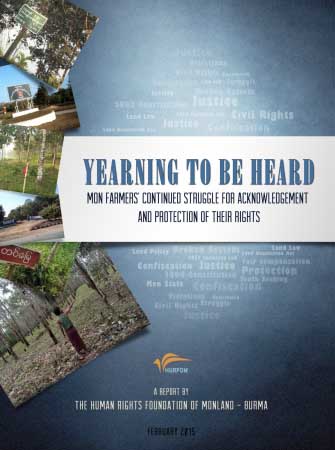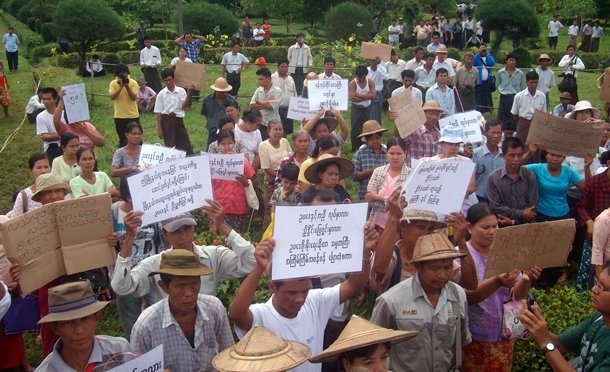Posts Tagged ‘Land Law’ (7 found)
Yearning to be Heard: Mon Farmers’ Continued Struggle for Acknowledgement and Protection of their Rights
 Land conflict is the most pressing issue facing Burma today, second only to armed conflict. Though Burma’s emerging democratic government has introduced land policy reform and has established land investigation commissions aimed to resolve land conflicts, civilian land acquisition by the Burmese military continues to take place, particularly in Burma’ minority ethnic areas.
Land conflict is the most pressing issue facing Burma today, second only to armed conflict. Though Burma’s emerging democratic government has introduced land policy reform and has established land investigation commissions aimed to resolve land conflicts, civilian land acquisition by the Burmese military continues to take place, particularly in Burma’ minority ethnic areas.
Coordination Committee for Civil Society Organizations Forum
The Coordination Committee for Civil Society Organizations Forum held a press conference at M3 Food Court in Rangoon regarding issues around Burma’s reform process. These include crises brought upon by newly enacted legislation and laws proposed during the present government’s reign, the absence of rule of law, and the repression suffered by human rights activists. These issues were also raised at a meeting on 13th January 2015 between Coordination Committee member organizations and the American human rights delegation led by US Assistant Secretary of State, Tom Malinowski […]
• • •Statement of Ethnic Community Development Forum and the Customary Land Protection Committee Concerning Myanmar’s National Land Use Policy (Draft)
On November 1 and 2, 2014 representatives of more than 30 organizations of civil society and farmers networks came together in a workshop to review and analyze the draft national land use policy of Myanmar. […]
• • •New National Land Use Policy Must Reflect the Concerns of those Affected
 The Burma Government released its draft land use policy document and opened it up for consultations with the public. Despite this positive sign, the time for consultations is inadequate with no proper mechanism or space created for the meaningful participation of affected communities in order for their concerns to be reflected in the draft. The draft document itself has been heavily criticized for serving to further empower investors over small scale farmers.
The Burma Government released its draft land use policy document and opened it up for consultations with the public. Despite this positive sign, the time for consultations is inadequate with no proper mechanism or space created for the meaningful participation of affected communities in order for their concerns to be reflected in the draft. The draft document itself has been heavily criticized for serving to further empower investors over small scale farmers.
Since the beginning of the reform process in 2011, land grabbing, a practice that the previous military regime engaged in regularly, has hit new heights as a flurry of investors seek opportunities in previously untapped markets and the Burma Government liberalizes the economy. A prime example of this is the Dawei Special Economic Zone (SEZ) Project, a joint Thailand–Burma Government initiative that is seeking private investment to create one of the largest industrial zones in Asia. A report released by Dawei Development Association on 21 October 2014 highlights how 20-36 villages will be negatively affected. Concerns iterated by the local communities show that they have “lost farmlands and natural resources that are vital to their livelihoods, without prior information.” Furthermore “there was no meaningful consultation, and a deeply flawed compensation process.”
Land grabbing is often done with protection from the military, or by the military itself, for factories, infrastructure projects, mono-crop plantations, or military bases, and as with the Dawei SEZ case, usually without adequate or indeed, any compensation. It is a nationwide problem, both in ethnic areas, as documented by the Human Rights Foundation of Monland and Karen Human Rights Group, while in central Burma and delta areas, land grabbing is common place. Given that around 70% of the population of Burma is engaged in agriculture, and it is agricultural lands that are most often confiscated, it is one of the most pressing issues for Burma today […]
• • •Pro-Business or Pro-Poor?
 Making Sense of recently unveiled Draft National Land Use Policy
Making Sense of recently unveiled Draft National Land Use Policy
October 18, 2014 saw the official unveiling by the government of the Republic of the Union of Myanmar of its much-awaited draft national land use policy. Once it is finalized, the new policy will guide the establishment of a new overarching framework for the governance of tenure of land and related natural resources like forests for years to come. As such, it is of vital importance.
This preliminary assessment aims to shed light on the key aspects of the draft policy and its potential implications for the country’s majority rural working poor, especially its ethnic minority peoples, although they are not the only ones whose future prospects hinge on how this policy making process will unfold. […]
• • •Myanmar at the HLP Crossroads
Few issues are as frequently discussed and politically charged in transitional Myanmar as the state of housing, land and property (HLP) rights. The effectiveness of the laws and policies that address the fundamental and universal human need for a place to live, to raise a family […]
• •








 All posts
All posts